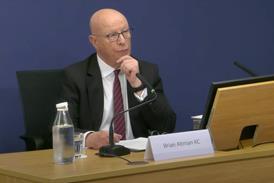‘Cruel and calculated’ serial killer Lucy Letby was today sentenced to a whole-life term in prison with no chance of parole for the murder of seven babies and the attempted murder of six.
The sentencing was broadcast but Letby refused to attend, prompting calls for a law change to compel defendants to be present at sentencing.
Lord chancellor Alex Chalk tweeted: ‘Lucy Letby is not just a murderer but a coward, whose failure to face her victims’ families – refusing to hear their impact statements and society’s condemnation - is the final insult. We are looking to change the law so offenders can be compelled to attend sentencing hearings.’

However Bill Waddington, of the Criminal Law Solicitors’ Association, warned that forcing someone to come to court could bring a ‘whole host of problems’. He added: ‘Nobody can force [defendants] to listen or force them not to disrupt proceedings if they were to do so. If a defendant were to disrupt proceedings, the judge would instantly say we will carry on the rest of the hearing without you. It is very difficult to see how any sort of change in the law could force people to come and sit in court if they choose not to do so.
‘One suggestion I have seen is that if they refuse to come, they are forced to watch it via video link but again there is a problem. They can be muted so nobody can hear what they are saying but nobody can force them to keep their eyes open or stop them messing about on screen. It is extremely difficult it seems to me.
‘It is not an easy topic. A law change simply saying the defendant must attend sentencing [is not enough], otherwise what?’
Kirsty Brimelow KC, chair of the Criminal Bar Association, told the media: ‘The actual presence of a defendant during their trial and during their sentencing is the right of a defendant. What used to happen was that if you had a defendant who was refusing to come to court there would be a huge discussion over whether the trial could carry on in their absence and so the law was changed to enable trials to carry on in their absence.
‘Essentially, if somebody is refusing to come to court [you] could start to look at the technology. We’re in very different times post-Covid to where we were before, we have live links to prison all the time so you could look at extending the technology to include a feed, so that the court proceedings are transmitted to a person’s cell.
‘As for a two-way, so you see the expression, I would be very cautious about that. There is a lot of assumptions there that you’re going to get an expression that is somewhat satisfying to the family. Unfortunately, at this stage I have seen it very often with defendants I have been in court [with] being sentenced for the most grave crimes, the families are dissatisfied by how they reacted and they haven’t actually got much comfort out of their presence actually in court. But, of course, they should be there.’
Criminal defence lawyer and managing partner at Berris Law, Seema Dosaj said: ‘Requiring defendants to attend sentence hearings is a crucial affirmation of the principles that underpin our justice system. Just as the accused’s presence is essential during trial to safeguard their rights, so too is their attendance at sentence hearings pivotal to ensuring transparency, accountability, and the legitimacy of the sentencing process.
‘This practice not only empowers defendants by granting them the opportunity to address the court directly, but also serves as a reminder that justice is not an abstract concept; it’s a tangible, human experience that demands fairness, compassion, and the acknowledgment of every individual’s role within the legal framework.
‘By attending sentence hearings, defendants and society alike are reminded that every decision made within the courtroom has real-life implications, fostering a deeper respect for the law and the values it upholds.’
Speaking before the sentencing, Tana Adkin, vice chair of the Criminal Bar Association said: ‘We cannot allow emotion into our courts and indeed juries are directed not to bring emotion into their deliberating and whilst it is a tragic case and my heart goes out to these families. We must not allow the court process to be disrupted in any way and forcing defendants into the dock doesn’t help.’
Solicitor Tamlin Bolton, who represents the parents of seven of the victims in the civil courts, told BBC Radio 4's The World at One that Letby's non-attendance would provoke anger from the relatives and showed her disregard for them.
'I imagine many of the families, not only those that we represent, all feel extremely angry she didn't attend today. It really is the final insult. There's a guilty verdict, there's going to be a sentence but not facing the consequences of those actions speaks of complete disregard, not only for the damage she's caused but it's an insult to our judicial system and the process.'
This article is now closed for comment.

























56 Readers' comments